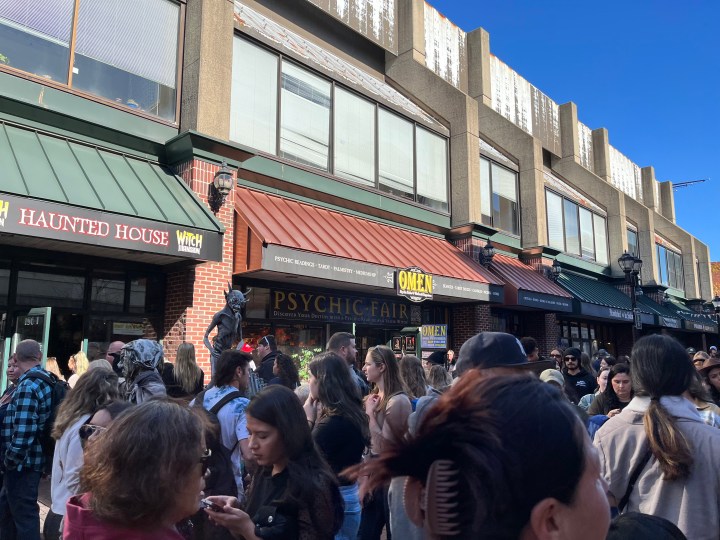
Salem’s complicated journey from witch trials to witch tourism
Salem’s complicated journey from witch trials to witch tourism

Salem, Massachusetts is infamous for a dark period in colonial history: the witch trials of the 1690s. More than 200 people were accused of practicing witchcraft, and, by the end of it, 24 people had been executed, including 19 women who were hanged.
To say Salem has been transformed since then would be an understatement. In direct odds with its history, Salem now brands itself as the “Witch City” and has become something of a supernatural Mecca for tourists. Hundreds of thousands of visitors descend on the city each year to celebrate Halloween, bringing in about $140 million to the town annually.
Visitors to the town are greeted by a main street teeming with psychic shops, monster exhibits, ghost tours, and a torrent of witch merch and paraphernalia.
Kathryn Miles is an investigative journalist who wrote all about Salem’s past and present for Boston Magazine. She joined Marketplace’s Kai Ryssdal to talk about the story of a tourist economy based on a complicated history. A transcript of their conversation is below and has been edited for clarity.
Kai Ryssdal: Were I to go to Salem, Massachusetts on a Saturday in the month of October, what would await me?
Kathryn Miles: Lots of other people doing the exact same thing. It’s incredible just how many people filter into this little town every year to celebrate a variety of different versions of Halloween. And then there are these tourists and gawkers who come dressed in goth clothing and parade around the town. And it’s, you know, it’s kind of fun spectacle.
Ryssdal: There’s a lot to unpack, right? Because this is a complicated, complicated story, but the slice we want to get to is how the town as it were has decided that this is their industry kinda, right?
Miles: Right. And that goes back to about 1880 when the town first started calling itself ‘Witch City’ and selling everything from commemorative plates to soaps and elixirs and things like that. So this is a story that’s really over 140 years in the making.
Ryssdal: This is a horribly crass thing to say. And I don’t know if you know the answer, but I imagine the entire Salem economy is dependent on this month of October.
Miles: It is. Over I think about 35% of their annual economy comes in the month of October. And that, again, is people who are just sort of fans. And I think kind of witch curious, and also this emerging group of practicing witches. This is a high holy day for them, and they like to gather there to practice their religion.
Ryssdal: I’m sure they do. And it’s probably a special place for them. But we have to point out that, historically, it’s a horrible place where people were executed because of lies and misinformation. And yet here we are now, something like 300 years later, and we have commercialized it.
Miles: Completely, right? And it’s really interesting, because this is happening when there’s this large scale, global truth and reconciliation work being done about people who were executed for witchcraft. And in fact, a group of very intrepid middle schoolers in Massachusetts successfully petitioned to have the last of those 19 victims from Salem pardoned this summer.
Ryssdal: When you go to Salem, what do you think when you look around?
Miles: I think there’s a lot to talk about. You know, the history is very personal for me. My ancestor was executed for heresy and witchcraft in 1660, and so it’s always been part of my family history and our family lore. And there were really scores of women in colonial America executed for witchcraft, many of whom were actually practicing midwives or political activists. And, you know, obviously, we cannot turn a blind eye to that, and we need to really have a reconciliation with that. But you know, I also have a lot of respect for practicing witches. I think it’s really about sex and body positivity, and I think it’s about sort of like this idea of manifesting internal strength. So, so long as you can kind of hold all of those things in your mind simultaneously, I think it’s a great place to be.
Ryssdal: When you talk to the locals, are they like, “Yeah, this is our thing. This is this is what we do, and we’re okay with it”?
Miles: There’s a real mix. I think that obviously for a lot of the sort of post-industrial, post-Mill towns, you know, how do you as a town make a viable living? And certainly I think there are residents who are really offended that what was ultimately, you know, genocide has now been commercialized. I think there’s other folks who maybe ideologically don’t have a problem with it, but really hate that they can’t find a parking space. So I think there’s all sorts of emotions happening there.
There’s a lot happening in the world. Through it all, Marketplace is here for you.
You rely on Marketplace to break down the world’s events and tell you how it affects you in a fact-based, approachable way. We rely on your financial support to keep making that possible.
Your donation today powers the independent journalism that you rely on. For just $5/month, you can help sustain Marketplace so we can keep reporting on the things that matter to you.

















